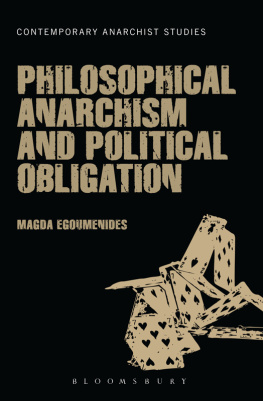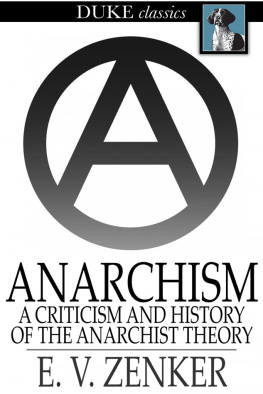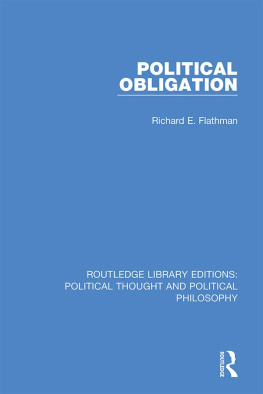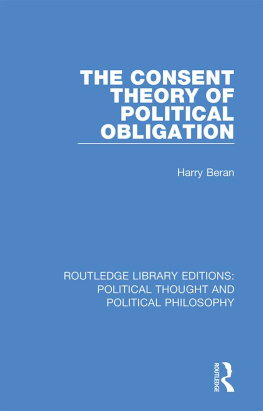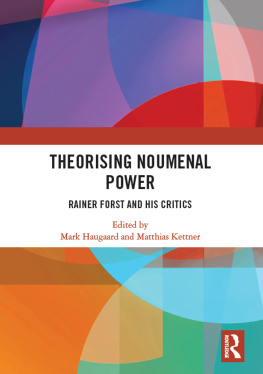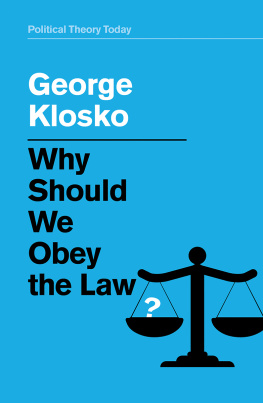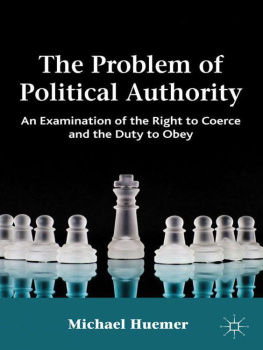Philosophical
Anarchism and
Political Obligation
CONTEMPORARY ANARCHIST STUDIES
A series edited by
Laurence Davis, University College Cork, Ireland
Uri Gordon, Loughborough University, UK
Nathan Jun, Midwestern State University, USA
Alex Prichard, Exeter University, UK
Contemporary Anarchist Studies promotes the study of anarchism as a framework for understanding and acting on the most pressing problems of our times. The series publishes cutting-edge, socially engaged scholarship from around the worldbridging theory and practice, academic rigor and the insights of contemporary activism.
The topical scope of the series encompasses anarchist history and theory broadly construed; individual anarchist thinkers; anarchist informed analysis of current issues and institutions; and anarchist or anarchist-inspired movements and practices. Contributions informed by anti-capitalist, feminist, ecological, indigenous, and non-Western or global South anarchist perspectives are particularly welcome. So, too, are manuscripts that promise to illuminate the relationships between the personal and the political aspects of transformative social change, local and global problems, and anarchism and other movements and ideologies. Above all, we wish to publish books that will help activist scholars and scholar activists think about how to challenge and build real alternatives to existing structures of oppression and injustice.
International Editorial Advisory Board:
Martha Ackelsberg, Smith College
John Clark, Loyola University
Jesse Cohn, Purdue University
Ronald Creagh, Universit Paul Valry
Marianne Enckell, Centre International de Recherches sur lAnarchisme
Benjamin Franks, University of Glasgow
Judy Greenway, Independent Scholar
Ruth Kinna, Loughborough University
Todd May, Clemson University
Salvo Vaccaro, Universit di Palermo
Lucien van der Walt, Rhodes University
Charles Weigl, AK Press
Other titles in the series:
Anarchism and Political Modernity
Angelic Troublemakers
The Concealment of the State
Daoism and Anarchism
The Impossible Community
Lifestyle Politics and Radical Activism
Making Another World Possible
Philosophical
Anarchism and
Political Obligation
Magda Egoumenides

For my beloved parents
The true exile is never at home.
Paul McLaughlin, Anarchism and Authority:
A Philosophical Introduction to Classical Anarchism (Farnham: Ashgate, 2007), 78.
The state is a condition, a certain relationship among
human beings, a mode of behaviour between men;
we destroy it by constructing other relationships, by behaving
differently toward one another.
Gustav Landauer, Schwache Stattsmnner, Schwacheres Volk!
Der Sozialist, June, 1910.
CONTENTS
In this study I define and defend critical philosophical anarchism, showing it to be superior to alternative approaches to the problem of the justification of political institutions. In particular, I lay out and examine the critical philosophical anarchist approach to the problem of political obligation, contrasting this approach with traditional treatments of the problem. The anarchist stance within the contemporary debate on political obligation has been dismissed too easily. I advance a clearer statement of the critical philosophical anarchist position than those currently available and demonstrate the continued value of adopting an anarchist perspective on the problem of political authority.
This study has nine chapters. In the Introduction, I set out my argument and the anarchist position I want to defend. The first chapter presents the problem of political obligation, the main aspects of this central problem and the main argument for the solution that I develop in the following chapters. I connect the perspective of critical philosophical anarchism on the main tasks and aims of political anarchism with a more comprehensive anarchist political theory and approach to society. In the conclusion I tie together my argument for critical philosophical anarchism as developed over the course of the study.
This study is the result of a series of arguments about and discussions on the issue of political authority. I am indebted to those who inspired my thinking and helped me formulate the ideas presented. They are too many to mention.
I would like to thank the series editors of Contemporary Anarchist Studies, especially Dr Alex Prichard and Assistant Professor Nathan Jun, and the team in Bloomsbury, especially Ally Jane Grossan and Kaitlin Fontana, for giving me the wonderful opportunity to write this book and having it published, as well as Rajakumari Ganessin for her help in the process. I would like to express my gratitude to my friends and ex- PhD supervisors Professor Vronique Munoz-Dard and Professor Jonathan Wolff for their continual advice, encouragement, and devotion. Furthermore, I would like to thank Professor Christopher Schabel for his support.
I am grateful to my parents for their endless love and support.
I would like to thank Professor Vassos Karageorghis, my mentor, for his constant support and influence on me; and Dr Meropi Tsimili, who has been a mother, a teacher, and a real friend to me.
Special thanks to my dear cousins Penelope and Matthew Papapetrou, George and Michael Christodoulides, as well as my dear friends Raj Sehgal, James Wilson, Saladin Meckled-Garcia, Ian Hulse, Isabella Muzio, Sara Santa-Clara, Tawny Gray, Sharon Shatil, Alex Voorhoeve, Andreas Onoufriou, Rena Choplarou, Giorgos Stogias, Lena Ioannou, Maria Michael Constantina Zanou, Maria Polychronopoulou, Maria Rammata, Miltos Karkazis, Manos Farmakis, Marius Nabal, Melina Argyriou, Katerina Mansfield, Nancy Thomaidou Agamemnon Zakos, and Paris Papagiorgis for providing the intellectual, moral, and emotional background that enabled this work and for their continued belief in me.
According to Anarchism, relations of domination are immoral. The coercion and exploitation of one individual by another is unjustified, as is the control of the individual by a collective, such as the state. The values of freedom and equality are paramount. A strand of anarchism expresses these positions within the philosophical debate on political obligation, and this has a distinct impact on our approach to political institutions.
Anarchism is scepticism towards authority. Opposition to the states right to rule, although a non-definitive anarchist concern, is common to all forms of anarchism and its proponents, despite the variety and division among them. The rejection of the states right to rule relates to the stronger anarchist challenge to its right to exist. This challenge is the upshot of political anarchism, which maintains that the state must be resisted as an evil and a new social form must emerge that succeeds the state and constitutes an improvement on societies organized around the state. Thus, in order to pave the way for a complete evaluation of anarchism, including the project of political anarchism, it is helpful to examine first the principled rejection of political authority that philosophical anarchism proposes and to detail the positive views, if any, that it expresses. My strategy throughout this study will be to examine this challenge as formulated within the debate on political obligation.
In this introduction, I briefly describe four basic forms of anarchism by way of a preface in order to clarify the theoretical perspective of critical philosophical anarchism that I defend, placing it in the context of the current debate on anarchism. Then I discuss the main parts of my argument and a number of underlying ideas that help us assess the general contribution of philosophical anarchism to the problem of political authority.
Next page
